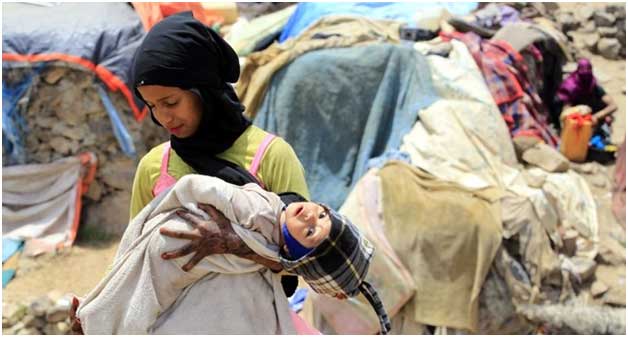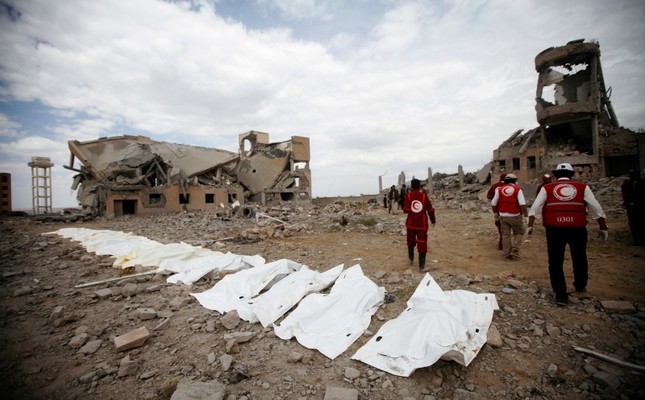
Write Congress: Restore USAID funding to Yemen now!
(May 23, 2020) — Reports of coronavirus spreading in Aden, Sana’a, and Hadramout are breaking from Yemen. And experts predict the numbers are much, much higher due to lack of testing and false reporting.
But the Trump administration suspended humanitarian aid to Yemen at the beginning of this pandemic.
On a regular day, with the United States’ complicity in the brutal Saudi- and Emirati-led war raging in Yemen, this aid suspension is horrific. And during these unprecedented pandemic days, it’s UNCONSCIONABLE. Yemenis don’t have nearly enough tests, masks, ICU beds, ventilators, and PPE.
The thing is, Congress already appropriated this aid for Yemen. So it can demand the Trump administration not block humanitarian aid to Yemen any longer. And we have the ability to make sure our members of Congress hear us loud and clear that we want them to do everything they can. Today.
ACTION: Write your Representative and Senators now and urge they press USAID to restore funding to Yemen in the face of coronavirus!

THE LETTER
Dear members of the US House of Representatives and US Senate,
I urge you to do everything in your power to press USAID to reverse its suspension of tens of millions of dollars in congressionally appropriated assistance to Yemen. Prior to the onset of COVID-19, these cuts would have had dire consequences for Yemenis already suffering through the world’s largest humanitarian crisis. Now, with the UN recording COVID cases in multiple Yemeni communities, this aid suspension threatens to exacerbate the virus’s toll in a country where millions are already immunocompromised from years of war and near-starvation.
Thank you.
America Is Likely Complicit in War Crimes in Yemen. It’s Time to Hold the US to Account

(October 3, 2019) — ince Saudi Arabia and its allies intervened in Yemen’s civil war in March 2015, the United States gave its full support to a relentless air campaign where Saudi warplanes and bombs hit thousands of targets, including civilian sites and infrastructure, with impunity. From the beginning, US officials insisted that American weapons, training and intelligence assistance would help the Saudis avoid causing even more civilian casualties.
But this was a lie meant to obscure one of the least understood aspects of US support for Saudi Arabia and its allies in Yemen: it’s not that Saudi-led forces don’t know how to use American-made weapons or need help in choosing targets. They have deliberately targeted civilians and Yemen’s infrastructure since the war’s early days — and US officials have recognized this since at least 2016 and done little to stop it.
A team of United Nations investigators, commissioned by the UN Human Rights Council, presented a devastating report in Geneva in early September detailing how the US, along with Britain and France, are likely complicit in war crimes in Yemen because of continued weapons sales and intelligence support to the Saudis and their allies, especially the United Arab Emirates.
Despite pressure from Saudi Arabia, the Human Rights Council voted last Thursday to extend its investigation.
If the council pursues an aggressive investigation based on the 274-page report, the world might finally see some accountability for war crimes committed in Yemen over the past five years. The report’s authors submitted a secret list of individuals who may be responsible for war crimes to the UN human rights commissioner, Michelle Bachelet, but it’s unclear if that list includes any western officials.
The report said third states that have influence on Yemen’s warring parties — including the US, Britain, France and Iran — “may be held responsible for providing aid or assistance for the commission of international law violations”.
American complicity in the Yemen war goes beyond providing training and intelligence support, and selling billions of dollars in weapons to the UAE and Saudi Arabia, which has become Washington’s largest weapons buyer. The US is looking the other way while its allies commit war crimes and avoid responsibility for instigating the world’s worst humanitarian crisis.
The full scope of human suffering in Yemen has been partly obscured because the UN stopped updating civilian deaths in January 2017, when the toll reached 10,000. And while the actual death toll is far higher, many news reports still rely on the outdated UN figures.
In June, an independent monitoring group, the Armed Conflict Location & Event Data Project, released a report detailing more than 90,000 fatalities since the war began in 2015.
In April, the United Nations Development Programme issued a report warning that the death toll in Yemen could rise to 233,000 by the end of 2019 — far higher than previous estimates. That projection includes deaths from combat as well as 131,000 indirect deaths due to the lack of food, health crises such as a cholera epidemic, and damage to Yemen’s infrastructure.
Beyond the moral reasons for the US to help end Yemenis’ suffering, the conflict has also harmed American interests in the region. The Yemen war has created new instability in the wider Middle East, and increased tensions between regional rivals Iran and Saudi Arabia. The Saudis and their allies support Yemen’s internationally recognized government, while Iran supports the Houthi rebels, who took control of the country’s major cities in 2014.
On 14 September, the Houthis claimed responsibility for attacks on two major oil installations in Saudi Arabia, saying they were retaliation for the Saudi bombing of Yemen. But Saudi leaders and Donald Trump’s administration blamed Iran for the attacks, without providing direct evidence. Trump has threatened to carry out military strikes and impose additional sanctions against Tehran, after he unilaterally withdrew the US from an international agreement signed in 2015 that limited Iran’s nuclear program.
For its part, Saudi Arabia quickly invited American and UN experts to help investigate the attacks on its oil facilities. Ironically, Saudi officials have refused to cooperate with most international investigations of their actions in Yemen, including the recent UN report that found the kingdom and its allies likely committed war crimes.
Like previous investigations by human rights groups and journalists, the UN report documented how the Saudi-led coalition has killed thousands of civilians in airstrikes; intentionally starved Yemenis as a war tactic; and imposed a naval and air blockade on Houthi-controlled areas that has drastically limited deliveries of humanitarian aid. The report also found that the Houthis likely committed war crimes by planting landmines, deploying siege tactics against several cities, using child soldiers and indiscriminately bombing civilian areas.
Despite years of warnings from groups like Human Rights Watch and UN investigations that documented growing evidence of war crimes in Yemen, US officials — first under Barack Obama’s administration and then under Trump — continued to approve weapons sales to the Saudi and Emirati militaries. US officials realized as far back as 2016 that senior Saudi and UAE leaders were not interested in reducing civilian deaths in Yemen, according to two members of the Obama administration who gave little-noticed testimony before Congress in early March.
Speaking to the House subcommittee on the Middle East, North Africa and international terrorism, the former officials — Dafna Rand, an ex-deputy assistant secretary of state, and Jeremy Konyndyk, the former director of the Office of US Foreign Disaster Assistance — outlined how US officials helped the Saudis choose their targets in Yemen, created “no-strike” lists and sent trainers to reduce civilian harm.
“We came to the conclusion by late 2016 that although there were very many well-meaning and professional generals in the Saudi ministry of defense, there was a lack of political will at the top senior levels to reduce the number of civilian casualties,” Rand told the committee.

UN report on Yemen finds US, France and UK complicit in war crimes.
Saudi and allied warplanes have conducted more than 20,000 airstrikes on Yemen since the war began, an average of 12 attacks a day, according to the Yemen Data Project. Only about a third of these attacks are on military targets. The coalition has also bombed hospitals, schools, markets, mosques, farms, factories, bridges, and power and water treatment plants.
One of the most persistent false arguments advanced by Trump administration officials against efforts to end US involvement in Yemen is that the Saudis need American support and training to prevent even more civilians deaths. But the latest UN report belies that argument, showing the Saudis have not done any credible investigations into their attacks on civilians or taken enough measures to minimize casualties, even with US and British training.
In fact, the UN findings reinforce revelations from a recent UK case brought by anti-war campaigners. A UK court of appeal ruled that British arms sales to Saudi Arabia were illegal. Documents presented during the case showed that, despite the British government’s claims, Saudi bombings of civilian targets took place within days after the UK provided training to the Saudi air force.
Despite the mounting evidence of war crimes, Trump still firmly supports Mohammed bin Salman, the ruthless Saudi crown prince who is an architect of the Yemen war. Since April, Trump has used his veto power four times to prevent Congress from withdrawing US military support and ending weapons sales to Saudi Arabia and its allies. Congress could not muster enough votes to override Trump’s vetoes.
The latest UN investigation, which found the US is likely complicit in war crimes, should give new momentum to the majority in Congress that wants to end American involvement in a disastrous conflict.
Mohamad Bazzi, a journalism professor at New York University, is a former Middle East bureau chief at Newsday. He is writing a book on the proxy wars between Saudi Arabia and Iran
Posted in accordance with Title 17, Section 107, US Code, for noncommercial, educational purposes.